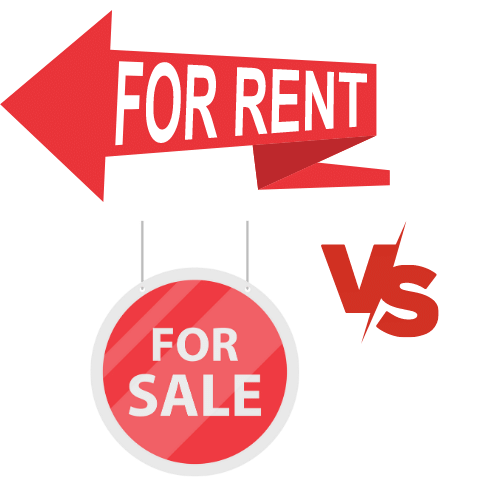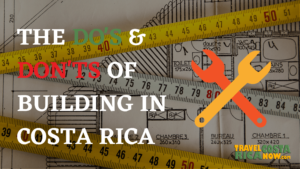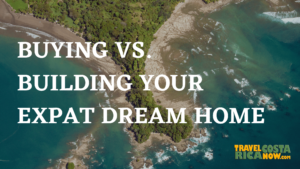
Step into the world of 🏝️ Costa Rica’s real estate market with michael alan of 🇨🇷 Travel Costa Rica Now – Real Estate and Costa Rica Matt from Coldwell Bankers. Their engaging 🗣 conversation takes place in the beautiful Tamarindo 🌴 area, where they share their 🧠 knowledge and 👀 insights on the real estate sector in the summer of 2022. This friendly 💬 chat covers topics such as whether it’s a 1️⃣ buyer’s or seller’s market, 2️⃣ hot properties, 3️⃣ how to get a good deal, and the 4️⃣ benefits of renting before buying. They also touch on ✨luxury homes✨ and the current trend of everyone selling land. If you have any ❔ questions about selling your land, business, or house in Costa Rica, Travel Costa Rica Now – Real Estate can help. 🤔 While they’re not trying to convince anyone to buy property in 🇨🇷 Costa Rica, they do want to give you a well-rounded 👀 perspective of the current market. It’s clear that michael and Matt share the same sensibilities about living the 🇨🇷 pura vida lifestyle


in Costa Rica and recommend that you spend at least 6️⃣ months to a year living here before making any major purchases. They advise against ❌ buying anything until you’re sure you want to make Costa Rica your home, and suggest ✅ renting before buying to save both money and stress. With gringo pricing a real factor, it’s best to be well-informed before making any decisions. 💭
What Was Said In the Video
I’m michael alan for Travel Costa Rica Now Real Estate. We’re going to be talking to our old friend Matt and see what’s happening up in his area. Hey guys, you know what? YouTube is tough, man. I would appreciate the subscribe. We’re trying to work this channel, get some subscribers, but you’ve got to hit that notification bell if you want to see our latest video. If you don’t know who Matt is, we’re going to be talking to him. He also has a channel and a website and all that. Go hit his notification bell, go hit his subscribe button.
Ring my bell.
Now, when it comes to donations, Travel Costa Rica Now, because we’ve got to keep the lights on. Matt spends selling houses. He doesn’t need any of that. So, all right, Matt, thanks man. It’s been a while, man. It’s been a while.
Absolutely, it has. And you know, you’ve seen more of the same. I think we probably talked almost a year ago in an interview format, but you know, this area of Guanacaste has continued to be really a refuge for all kinds of people who are getting out of their situation in a city in the U.S or Canada. We’re seeing plenty of…
Germany.
Yes. And more and more, you know, we’ve gone from a place where 20-30 years ago, most of our buyers were purchasing investment condos or vacation properties. This is now a relocation destination. All right.
Wait, wait, wait, wait, stop. Wait, hold that thought. I want this video to stand on its own, so I want you to introduce yourself in a sense. And if we can, can we talk about ‘Latitude 10’ and you’re back doing this and where you’re kind of at and all that?
Okay.
So let’s rewind. We’re going to get back to that and kind of, okay, you had started your own real estate company called Latitude 10, and that wasn’t too long ago. You had initially worked at Coldwell Banker, started your own thing called Latitude 10, but quickly, a synopsis of that whole story, real quick.
Well, it goes back even further than Coldwell Banker. You know, I had started getting involved in real estate in 2012 when a developer who was also supporting my non-profit made me the sales agent at his projects, handling just these neighborhoods as basically a way to supplement my income. And then, in 2017, when our second son was born, it became very clear that I needed to upgrade my career a bit financially. And that’s when I joined Coldwell Banker Tamarindo and dedicated myself to becoming a full-time realtor. I spent four very happy years at Coldwell Banker Tamarindo and essentially reached a point where I sat down with the owner of the brokerage and said, “Look, I want to be the owner of my own real estate franchise here, sooner rather than later. What can you offer me in terms of opportunities to buy Coldwell Tamarindo?” And, to be honest, the price, the value of Coldwell Banker Tamarindo, is an enormous number that I would never frequently be able to buy that brokerage. So, at that juncture, I decided, “Well, I’ve got to start my own,” and Marie and I had always sort of been in business together. I’ve had my office here in Playa Junquillal since 2017. We opened it when I became a full-time realtor, so I’d have a good place to work here in the community. And at that juncture, in 2021, we decided, “Yep, let’s start our own brokerage,” and we’ll be Latitude 10 Realty, which had been Anne-Marie’s property management brand. We basically already had the logo, we had the websites; it was just about upgrading that to a real estate brokerage. And only recently, one of the people that I really, really love and respect, Larry Graziano, who is a national franchise partner in Coldwell Banker, said, “Hey, I’m going to start my own franchise, and if you’d like to partner with me on it, we could go in 50/50.” And really, I saw the enormous opportunity to, yes, become a Coldwell Banker franchise owner-operator. And really, one of the things that motivated me and Anne-Marie to go back to Coldwell is the huge asset that having a large team can be.
Right.
Also, it is a huge asset in Costa Rica to have a name that everybody knows and trusts. You know, Coldwell Banker, they started in 1906 or thereabouts. It’s hard to meet somebody who hasn’t had at least one of their family members buy or sell property through Coldwell Banker in the past. And especially as a 38-year-old trying to help people guide them in investing at times millions of dollars here in Costa Rica, being part of a huge multinational historic real estate brokerage is a huge benefit to my potential growth. It’s definitely a wonderful tag to add on your signature line, and it 100% makes people feel more comfortable if they’re going to invest in a foreign country. It’s tough to go with Banana Coast Realty. It’s much easier to say, “Oh, Coldwell Banker, I know this name, I know this establishment.” Aside from that, they also have amazing technology on the back-end. The reason we come up at the top of Costa Rica real estate Google search results is a massive web of coordination by that national franchise and then all of our 12 offices. That’s a pretty big benefit as well.
I think Matt likes Coldwell Banker. Congratulations on that. Just real quick, I want to again tell people to go check out your channel. But guys, he does something kind of similar to what we do. He just doesn’t have houses on there. He has a lot of different videos. He talks about a lot of different things. He has videos like, ‘Is Costa Rica even right for you?’ So, he’s just not a bunch of property on there. He provides a lot of information, which is why we connected. We have kind of a similar mission statement. We want to make a little money, but we also want to be honest and prefer everyone to have a good experience. Alright Matt, let’s go. Okay, guys. If you don’t know, Guanacaste is the northwestern side of Costa Rica. Explain the area of what you’re doing, and I know it’s exploding, man. Yeah, I don’t even have to ask you that. I’m assuming it’s going well.
First of all, you can find me at my hashtag, which is just #CostaRicaMatt, all one word. I do spend a lot of time talking about the boring details of real estate transactions. I think I have hours just about the closing process, legal aspects of buying property, etc. and michael was absolutely wrong; I don’t want to make a little bit of money. Tamarindo, this Guanacaste area, really started to explode in the early 2000s when the Liberia International Airport started bringing flights down from the U.S. In the first years of the airport having this international capacity, the government here had to even bribe an airline. Basically, they put millions into escrow and said if you don’t fill up your first regular flight after one year, you can have this money as payment for bringing the flight down. Well, all of a sudden, you saw that flight fill up, and then airlines opened more and more routes. And from 2000 until 2009, the region had an absolute frenzy, a real bubble that happened because all of a sudden these foreigners with a lot of capital and all this money that they were getting from the mortgage market in the U.S. were landing in sleepy Guanacaste. At the same time, you had pretty much every farmer abandoning the cattle ranches or trying to basically get out of agriculture because it was no longer profitable for small farmers in Guanacaste.
I remember this. I was in Costa Rica during, I mean, I didn’t get here until 2005, but I remember even just Tamarindo itself, I think if I recall, it was like one of the number one places of real estate in the world. They were selling so much real estate. Do I got that right, or one of the top sellers? I don’t know.
Yeah, it was absolutely crazy, where you had people who would buy farms for 10% of what they could turn around and sell it for once it had been simply subdivided and made into lots. This dynamic, where you might find a 100-acre farm for a couple hundred thousand bucks, as soon as you’ve got roads, a pool, and other amenities for a gated community on that same farm, you might only have maybe four to five hundred thousand dollars of startup cost for a community, but suddenly you’ve got 100-acre size lots that were selling each for a hundred, hundred fifty, two hundred thousand dollars. If they were close to the beach. And that frenzy continued until 2009, and even a little bit after things crashed, you know, and really started to deteriorate in the U.S. financial scene. You still had a little bit of momentum that happened, but then as of 2010 onward, really the sucking sound of all of that capital getting sucked out of Costa Rica, or Guanacaste specifically, left a ton of unfinished developments. At that moment, the market fell so hard, you saw people who had condo buildings that were 80 percent of the way done who just shut down. There are still abandoned condo towers outside of Tamarindo, our enormous hub. You still see abandoned projects outside of Jaco down in the Central Pacific. So up here, essentially, you saw things stop in their tracks and from 2000, you know, for the next five or six years, really prices were headed downward. You could find great deals on some of that real estate that had been created for the boom. And it wasn’t until the last five or six years that you really started to see things pick up again.
But don’t you think they’re picking? I mean, they’re not just picking up. I mean, I’m assuming, uh, that it’s kind of on fire up there right? The last I had this, I mean, COVID started it right in a sense?
No, absolutely. When we, you know, 2019 was the beginning of what felt like another frenzy, where all of a sudden, you know, you saw developers getting moving forward again and you saw that available real estate getting bought up. Now obviously, in 2020 when we had the international border closure and no one could come in, that was another year where things were just stopped. I was essentially unemployed for the nine months of the border closure. But as soon as things opened up, yes, just like you’re seeing revenge travel, you saw this urge that people have to go to a new place, get out of a city, get into a tropical, relaxed environment where they thought they would have more freedom, more outdoors time. And suddenly one of the things that you had happened was that.
You know, Guanacaste over the last decade has gotten a good number of private schools that cater to expats. We’ve had fiber optic internet installed throughout the province, and down in the coastal areas, you can find incredible internet connections readily available everywhere. And because there had been this boom, and because we have so many expats, there’s been a lot of amenities and services created to meet the demand that the expats bring. And so suddenly, Guanacaste was not only desirable for being this beautiful beach, sunny place, but it’s also 100% livable and easy to transition to for all kinds of people. Whereas in the early 2000s, you had a ton of retirees, a ton of investors looking for vacation properties.
Yeah, I want to add, can I stop that? I want to ask you that question. What’s up? I don’t know, maybe this isn’t a good question, but I always kind of thought as Tamarindo is a lot of people having a lot of places, but they didn’t live there, they visited there a lot. But now with the onset of building schools and stuff, are you seeing a difference of families coming more often? Because am I right about that, that there was a large percentage of just people buying, you know, the condo by the beach, they come down here for two months, and they’re back to, you know, hometown or whatever? I’m sure that still happens, but is there have you seen any kind of change in that?
Yeah, that’s been the entire, you know, Guanacaste has shifted, or the real estate market specifically has shifted enormously towards people who are permanently relocating, or they believe they’re permanently relocating, and away from those people who previously were only buying their sort of snowbird vacation home or an investment condo. There’s no data available because our real estate market doesn’t have that kind of information. But you know, whereas 20 years ago it was a rare family moving down, now, I say that it’s got to be more than half of the clients that we’re seeing come down to purchase are actually younger families with kids, anywhere from infants up to 16-year-olds. And really, the shift from investment potential and vacation property has gone entirely towards, “I want my refuge in Costa Rica, I’m buying a one-way ticket, and never looking back.” And even in quiet communities, so we’re talking about Tamarindo, and you still see a lot of people who are buying as an investment there, they have incredibly high occupancy rates. You know, the organic tourism that comes through Tamarindo is huge just because they have a wonderful learner’s surf break and a great nightlife and all this sort of playground atmosphere. In a lot of communities outside of Tamarindo, you know, up towards Playa Grande, Potrero, even Flamingo, you’ve seen this rush of people absolutely just relocating, and it’s, you know, it’s changed the rental market here incredibly. You used to be able to find all kinds of offerings where, if you were a responsible expat living here, you could almost find people who would let you stay at their property for free in some of these communities as a caretaker. I still get people asking me, “Oh, you know,” they’ll post in a Facebook group, “Hi, we’re a responsible family of three, and if you need help maintaining your property.” That doesn’t happen anymore. You can get…
They’re all Airbnb’s, everything’s an Airbnb now, which has really hurt the rental market side.
Now you can get, you know, $1,500 a month for a 1,000 square foot, relatively old and dark condo in Tamarindo. You can get, you know, if you have a three-bedroom and it’s slightly nicer, you could ask $2,500-$3,000, and those are monthly, long-term rental rates.
Ouch.
You know, even here in Junquillal, which is my quiet community 30 minutes south of Tamarindo, I’ve got people who bought nicer condos, you know, 1,400 square feet with a big patio and a much really high-quality complex, and they’re getting $2,000-$2,500 a month for a one-year lease at their beachside condo because there are so many people who are flooding into our market. And lo and behold, because things crashed so hard in 2010 and ’11, we had almost no new development or construction in those intervening years. So we went from, you know, this horrible crash in demand, all of a sudden, demand is feeling like we’re back in 2006 or ’07.
Is there more construction now? Is that picked up?
Yeah, absolutely. And you know, especially, you know what you had in Tamarindo and north, those beach communities had a water restriction in place from 2015 until 2021 that was lifted temporarily for a lot of places. And you saw in Tamarindo construction absolutely explode. You saw a lot of developers who had abandoned their plans in 2011 and ’12 are now back up and running, or they’ve sold off that land to somebody who sees the opportunity now. You’ve had Tamarindo Hills, Tamarindo Park, Senderos is a neighborhood that sold out, you know, basically two phases of lots that had been sitting on the market since 2013. All of these projects are now full steam ahead and you’re seeing building go up everywhere.
I’ve been…
Go ahead.
I’m sorry, I’ve, you know, been up there a lot of times but I don’t really pay attention. What would be the difference between, you know, everybody wants a condo by the beach but I’m sure that’s pricey. How far do you have to go back? How big is Tamarindo? Or could you be like a mile away from the beach and get a much better, uh, or I’m sorry, a cheaper thing? How far do you have to be out to get maybe more of a bargain price or does that even play?
Yeah, and you know, I would say, so, one of the things that happened in Guanacaste is that all of this development and speculation by foreigners has led, you know, you don’t find those absolutely amazing low prices that were available prior to 2009. Yes, if you’re in Tamarindo, you see lower prices every block you know back from the beach. I would say that the half mile right within Tamarindo is going to be premium pricing no matter what you’re looking at. There are back roads where you can find, you know, somewhat definitely a notch down on the price totem pole, but still, if you’ve got a house that’s within, you know, a reasonable drive to Tamarindo, you’re generally seeing that the prices reflect the fact that you have access to Tamarindo. And so for example, even, you know, three or four miles inland, you would still see, you know, right now we’ve got the Oaks Condos. They had been down in the 120, 140, 150 range for two-bedroom condos. These are, you know, four miles away from Tamarindo. They’ve all been bought up because people want to have access to the area, they want to be convenient to those schools, and now you find an Oaks Condo coming on the market at 190, 200, 210 simply because there’s scarcity. And anything within this corridor, and especially anything that puts you within a decent drive to a school, into those tourism hubs, the prices are still, you know, what I would call strong, to be polite.
I would rather kinda do something like what you’re doing because not a lot of people know about places like Playa Junquillal. What’s a Junquillal? I know Tamarindo. I’m assuming that, I’m sure its probably more beautiful there. But it’s probably not known. I’m not saying it’s bargain prices. I’m just saying probably maybe a little better prices. Than maybe something that’s…something like Tamarindo. Well, everyone knows Tamarindo. But I’m sure Playa Junquillal has probably got, is just as beautiful. It’s not that far away. But since it’s not quite as well known, I’m assuming that there might be better buys in other places that are…
One-hundred percent. For example, we had lots for sale that were walking distance to the beach, a couple were only 200 meters away, and they were each listed for $50,000 for a half-acre. Those sold three years ago. Then up the hill, five blocks away, we had quarter-acre to half-acre lots that were $60,000 to $80,000, and those sold last year. And yes you, those kinds of opportunities…you know, that same walking distance to the beach in Tamarindo, whereas we have a couple left that are in sort of the 80 to 90 thousand dollar range for a half-acre lot, in Tamarindo, if you were able to find 2,000 square meters of property that close to the beach in Tamarindo, it would easily cost hundreds of thousands of dollars. You might even be over a million if it were truly just a block from the beach and developable. So, absolutely, you can go outside of Tamarindo and branch out. If you want to be at the beach, there are all kinds of quiet communities between the big tourism hubs. You know, you go to Playa Grande, it has just exploded. Almost the same story, you know? Three years ago, I had clients buy quarter-acre lots there for $82,000 each. Currently, we were looking at analyzing the price of their property or the value. Nowadays, those same lots are offered at $250 to $270, because so many people have rushed to get into Grande. Obviously, the price point is gonna just go up, and we’re talking about a very finite resource when we’re talking about walking distance to a beach. Now, between Grande and Flamingo, there are six undiscovered, absolutely undeveloped raw beaches where you could probably still buy a farm for a reasonable price. You could, you know, you don’t find as much real estate inventory for sale in those areas, but you know, you find these little areas between the tourism hubs, and you can get much better pricing. Uh, going strike a lot…
Oh go ahead.
Well, I was just going to say the same thing south, you know? There’s Tamarindo up here. Further south on Guanacaste’s coast is Nosara. Nosara is absolutely insane where prices have gone. You can’t find a lot walking distance to the beach under half a million dollars, and you’ve seen $1.2 million dollar homes that, you know, 20 years ago would have sold for 25 to 30 percent of that amount. In between Nosara and Tamarindo, there’s a whole stretch of coastline that’s undeveloped, and where, yeah, if you want to live close to San Juanio Beach or Lagarto or Marbella, you can find totally different price points.
So, what kind of, I don’t know, who’s writing you now? I’m assuming you’re getting a lot of stuff from different countries, not just the United States and Canada.
Interesting, you know, I still get the bulk of my inquiries from the US and Canada. More often, I’m seeing now that the people who are writing me have already lived in several countries or they come from an international background. With the recent, even this past six weeks, you’ve seen some people become very hesitant. We’re filming this July 6th; the stock market over the last six months has declined 15 to 30 percent, depending on what index you’re looking at. You have seen a lot of the more conservative financial people; I had one pull out of a deal the day that the stock market took a particularly bad plunge. You’ve seen other people definitely become more reticent and hesitant with their plans. Rather than seeing people from new places, what has been the biggest change to me over the last couple of years is that I’m talking to a lot younger people. Where I used to have 90% of my conversations and most of my closings were 55 years old, the buyer and up, I’m having a lot more transactions happen with late 30s to mid 40s, people who are bringing their kids down. That’s been really the interesting thing to see that there are so many people who want this kind of experience for their kids. And yeah, we’ve gone from investment paradise and retirement now to really getting a ton of digital nomads, anybody who can work abroad, and these families moving down here with their kids.
So, you see, okay, so the market’s on fire, let’s do a little future. What do you think’s going to happen? What’s gonna be going on in two years, one year, five years?
I think one, two, and five years from now, things will have changed significantly. A lot of the people who are investing here, those families I mentioned, those mid-30s to mid-40-year-olds, they’re able to do so because they’re cashing out of an overheated market in the US or Canada. You know, they’re selling their Toronto apartment that’s currently worth $600,000 more than it was when they bought it eight or nine years ago. I think the biggest dynamic that’s going to start sort of sucking the wind out of our sails will be that, you know, you’re seeing the housing market in the US slow down significantly. It’s not one day and you get multiple offers on homes. You’ve seen that absolute peak and it’s tailing off as more and more people lose the ability to cash out that enormous amount of money from their US property. That’s going to really start to pull the reins back here a little bit and slow us down.
I definitely think you are absolutely right.
Yeah, and that’s fine, to be honest. Every time this frenzy of development happens, you know, you’re sort of doing a dance and a jig, and it’s great to have easy business and your bank account swelling, but then you go out to the beach and you see a whole heck of a lot more people than you did last year, and you start to think, “Oh man, what’s going to happen here? Is this just going to turn into another free-for-all?” And you know, more than anything, I think when people feel that insecurity and when we get global events that make people feel afraid, it’s to me, it’s counterintuitive, but a lot of people decide to leave Costa Rica and go home. At the beginning of the pandemic, whereas I thought, oh my gosh, this is great, we have the borders shut down, we live in an outdoor paradise, I’m gonna have a great time just sitting at home, tons and tons of families from our school immediately returned to their home country because they were feeling insecure. I even remember people being worried that crime was just going to become rampant in Costa Rica because of the unemployment. We actually saw a decrease in crime where we are, because tourism is one of the main victims of petty theft and these crimes that you see. It was actually safer to be in Guanacaste during COVID than it was in subsequent years. So, I do see that there’s that vulnerability, that insecurity, and the future tumultuous events that are definitely going to happen every year from here until the kingdom come that will drive a lot of people back to their home countries. And right now, the only question is when does that outflow become greater than the number of people who are investing? And right now, we’re still seeing that even with the stock market trouble, even with all of the political issues that really make people worried about their future, we still have a lot more people coming down than we do leaving. And for that reason, you’re seeing prices just go crazy in some areas. And if you want to be in an exclusive neighborhood with perfect amenities, you’re going to have to pay way more than you would have three, four, or five years ago. But all of these people that over the last three years have been impulse buying in Costa Rica, you know, they were scared of COVID or they just hated their government, or they didn’t want the restrictions. All of those people, they’re the kind of people that you and I try to, you know, at times caution and say wait, hold your horses, don’t just take the plunge. Now they’ve been here a couple of years and there’s going to start to be a stronger outflow of those people who made a quick decision. And you know, where those two lines intersect and we start seeing more people leaving than coming, I don’t know if it’s a year from now, if it’s a month from now, but I do see that dynamic eventually bringing our real estate market sort of back down to earth. I could be wrong. Those political events…
I don’t think, I don’t think you are, but guess what? We’re gonna be checking up on you. We’re not going to let a year go by again. Anyway, guys, if you want to get in contact with Matt or you don’t know his channel, I’m going to put that link in the description. If you’re thinking about buying, actually watch our videos first, and then maybe you can contact Matt or me at a later date. But anyway, all Matt’s information will be in the description. As always, Matt, we always appreciate talking to you. And again, guys, I don’t talk to anybody that’s not kind of similar thinking of me, as honest, transparent, wants to help somebody, but also, well, I guess he said he wants to make a lot of money so.
Alright Matt.
Just quickly.
Alright guys.
Thank you very much. I greatly appreciate it.
I’m michael alan, Travel Costa Rican Now – Real Estate. That’s Matt from, again say where. Matt.
Coldwell Banker Pacific Realty.
All right, man, thanks Matt. Peace.
In conclusion, if you’re thinking about investing in real estate in Costa Rica, it’s essential to seek advice from experts who know the local market inside and out. Michael Alan of Travel Costa Rica Now – Real Estate and Costa Rica Matt from Coldwell Bankers offer invaluable insights into the real estate sector in the Tamarindo area during the summer of 2022. They provide tips on finding hot properties, getting a good deal, and even advise against making any major purchases until you’ve lived in Costa Rica for at least six months to a year. Their shared sensibilities about the pura vida lifestyle in Costa Rica and cautious approach to real estate investments make them the ideal team to consult. Remember, with gringo pricing a real factor, it’s essential to be well-informed before making any decisions. So, whether you’re interested in selling your property or looking to buy, be sure to check out Michael and Matt’s videos and get in touch with Travel Costa Rica Now – Real Estate for the best advice on navigating Costa Rica’s real estate market.
- Modular HomesWelcome 🤗to our page on these popular Modular Homes 🏠here in Costa Rica, where modular homes are built that are crafted with quality, speed, and technology. These homes are designed to be simple yet luxurious, with insulated walls, teak wood, and the option for extra luxury upgrades. We believe in providing a stress-free home-building experience,…
- Talking Real Estate in Tamarindo ( Guanacaste Province ), Costa Rica w/Michael Alan & MattThis friendly chat covers topics such as whether it’s a buyer’s or seller’s market, hot properties, how to get a good deal, and the benefits of renting before buying. They also touch on luxury homes and the current trend of everyone selling land.
- Building a House in Costa Rica – Do’s and Dont’s, Pitfalls, Should You?
 5️⃣ years ago, she bought a little over an acre of land in 🇨🇷 La Fortuna, Costa Rica with the intention to build. Despite their 👀 lack of knowledge and experience in construction, Jillian and Arturo learned from the 😱 horror stories of others who did ❌ not conduct proper due diligence before building in 🇨🇷 Costa Rica.
5️⃣ years ago, she bought a little over an acre of land in 🇨🇷 La Fortuna, Costa Rica with the intention to build. Despite their 👀 lack of knowledge and experience in construction, Jillian and Arturo learned from the 😱 horror stories of others who did ❌ not conduct proper due diligence before building in 🇨🇷 Costa Rica. - Build or Buy Your Dream Home in Costa Rica? Retire, Relocate, Expat Life in Costa Rica
 In this current market hiccup, where sellers are flocking to the market and buyers are not coming down, you can find some fantastic deals in the Costa Rican real estate market. In fact, replacing most of the homes you see on real estate websites would cost less than building them from scratch. With motivated sellers looking to unload properties, you can even find similar or comparable homes for far less than what it would cost to build today,
In this current market hiccup, where sellers are flocking to the market and buyers are not coming down, you can find some fantastic deals in the Costa Rican real estate market. In fact, replacing most of the homes you see on real estate websites would cost less than building them from scratch. With motivated sellers looking to unload properties, you can even find similar or comparable homes for far less than what it would cost to build today, - Buying Property in Costa Rica – Talking With a Costa Rica Real Estate Lawyer – Should You Get a Lawyer
 We’re going to dive into the📜 basics of real estate law ⚖️ and what you can expect from a lawyer when buying property in Costa Rica. ⚖️👨⚖️📄 ⚖️ 🤝📜Who can own property? Do you have to be a resident? Do you need a lawyer? What do you need to know before buying a house in Costa Rica? We’ll cover it all.
We’re going to dive into the📜 basics of real estate law ⚖️ and what you can expect from a lawyer when buying property in Costa Rica. ⚖️👨⚖️📄 ⚖️ 🤝📜Who can own property? Do you have to be a resident? Do you need a lawyer? What do you need to know before buying a house in Costa Rica? We’ll cover it all. - Costa Rica What’s Happening in the Real Estate Market 2022
 🏡🌴In this informative video, we discuss the state of the Costa Rican real estate market 🇨🇷as we move from 2021 into 2022 and on to 2023. 👨👩👧👦We delve into the important questions that anyone interested in purchasing property in Costa Rica would want to know, 👍such as whether it is a buyer’s or seller’s market, the hottest properties, how to get a good deal, renting before buying, luxury homes, and the impact of Covid-19 on the housing market. 🇨🇷
🏡🌴In this informative video, we discuss the state of the Costa Rican real estate market 🇨🇷as we move from 2021 into 2022 and on to 2023. 👨👩👧👦We delve into the important questions that anyone interested in purchasing property in Costa Rica would want to know, 👍such as whether it is a buyer’s or seller’s market, the hottest properties, how to get a good deal, renting before buying, luxury homes, and the impact of Covid-19 on the housing market. 🇨🇷
